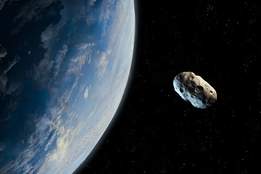as·ter·oid
ˈa-stə-ˌrȯid 

1
: any of the small rocky celestial bodies found especially between the orbits of Mars and Jupiter
2
: starfish
1
: resembling a star
asteroid bodies in sporotrichosis
2
: of or resembling a starfish
Love words? Need even more definitions?
Merriam-Webster unabridged











Share